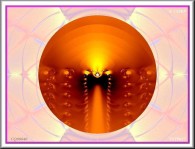Bob Moses, a veteran of the Civil Rights movement, identified Algebra as the gateway to equitable success in education for students. Without using the word ‘trim tab’ he saw the possibility of teaching Algebra with methods that would be effective for all students as a way to open the gates to advanced education for them. http://www.algebra.org
Since so many teachers and students struggle with math and since math is a gatekeeper to advanced classes for students, breakthroughs in math have powerful impact.
A math student teacher told me her university pedagogy instructor told her that math was the exception to the rule of transformative education—that you couldn’t go that deep in math. He has to be wrong since mathematical thinking has allowed scientists to conceive very complex explanations of our universe. I believe these explanations have potential to transform our whole view of existence.
I had once loved numbers and even though that got squashed in my early years in school and I don’t have the understanding I wish I had, I do have hunches about the possibilities even when there is pressure to comply with externally mandated standards, curricula and timelines.
1. Math is a brilliant way to describe phenomenon in the world. What if students heard the stories of mathematicians like Pythagoras and Newtown, from ancient to modern times who were able to think about our existence in ways they otherwise wouldn’t be able to? What about Einstein who provided us with brilliant comments about living, through words as well as numbers—two languages to express his understanding?
2. Math is a profound language, a symbol system, a way to hold onto, think about and describe complicated phenomena and dynamics in this world and beyond.
3. Using mathematics to consider phenomena, it is possible to predict results of actions. Who doesn’t want some predictability in this life?
4. Mathematical thinking, like the scientific inquiry process, provides useful tools to sort information in so many other disciplines. With an explicitly identified real context, Math can be about exploration, discovery and clarity at the same time. Statistics, economics, financial literacy, even quadratic equations have directly relevant applications in real life.
5. There is an aesthetic to the order, patterns, symmetry and sequence of mathematical operations that students with an artistic perspective can appreciate. People with strength in spatial intelligence often find joy (yes joy) in geometry. Algebra accesses the place in my brain that enjoys logic and puzzles.
It is important for math teachers to remember their love of math and what they love about it so they can share that with the rest of us. Then we can change the cultural assumptions around quantitative thinking, stop accepting that most kids and adults hate math and aren’t good at it.
We can provide opportunities for students who struggle and for those who ‘get math,’ to learn and explore rather than just comply as they slog through problems. I have yet to see greatness grow out of compliance. No matter what any of us do in life, the discipline and orderliness of mathematical habits of mind are a great gift.

